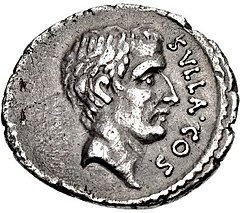Sulla | |
|---|---|
 | |
| Born | 138 BC[2][3][4][5] |
| Died | 78 BC (aged 60) |
| Nationality | Roman |
| Notable credit | Constitutional reforms of Sulla |
| Office | |
| Opponent | Gaius Marius |
| Spouses | |
| Children |
|
| Military career | |
| Service years | 107–82 BC |
| Wars | |
| Awards | Grass Crown |
Lucius Cornelius Sulla Felix (/ˈsʌlə/, Latin pronunciation: [ˈɫ̪uːkius̠ korˈneːlʲius̠ ˈs̠uɫːa ˈfeːlʲiːks̠]; 138–78 BC), commonly known as Sulla, was a Roman general and statesman.[8] He won the first major civil war in Roman history and became the first man of the Republic to seize power through force.
Sulla held the office of consul twice and revived the dictatorship. A gifted general, he achieved successes in wars against foreign and domestic opponents. Sulla rose to prominence during the war against the Numidian king Jugurtha, whom he captured as a result of Jugurtha's betrayal by the king's allies, although his superior Gaius Marius took credit for ending the war. He then fought successfully against Germanic tribes during the Cimbrian War, and Italian allies during the Social War. He was awarded the Grass Crown for his bravery at the Battle of Nola. Sulla was closely associated with Venus, adopting the title Epaphroditos meaning favoured of Aphrodite/Venus.[9][10]
Sulla played an important role in the long political struggle between the optimates and populares factions at Rome. He was a leader of the optimates, who sought to maintain senatorial supremacy against the populist reforms advocated by the populares, headed by Marius. In a dispute over the command of the war against Mithridates, initially awarded to Sulla by the Senate but withdrawn as a result of Marius' intrigues, Sulla marched on Rome in an unprecedented act and defeated Marian forces in battle. The populares seized power once he left with his army to Asia. He returned victorious from the east in 82 BC, marched on Rome again and crushed the populares and their Italian allies at the Battle of the Colline Gate.
Sulla revived the office of dictator, which had been dormant since the Second Punic War, over a century before. He used his powers to purge his opponents, and reform Roman constitutional laws, to restore the primacy of the Senate and limit the power of the tribunes of the plebs. Resigning his dictatorship in 79 BC, Sulla retired to private life and died the following year. Later political leaders such as Julius Caesar followed the precedent set by Sulla with his military coup to attain political power through force.
- ^ Crawford 1974, pp. 456–457.
- ^ Valerius Maximus, 9.3.8
- ^ Appian, 1.105
- ^ Plutarch, Life of Sulla, 6.10
- ^ Velleius Paterculus, 2.17.2
- ^ Badian 2012.
- ^ For list of offices and years, unless otherwise indicated, Broughton 1952, p. 557.
- ^ The name Felix – the fortunate – was attained later in life, as the Latin equivalent of the Greek nickname he had acquired during his campaigns, ἐπαφρόδιτος (epaphroditos), that is, beloved of Aphrodite or Venus (to Romans) – due to his skill and luck as a general.[citation needed]
- ^ The world of Pompeii. John Joseph Dobbins, Pedar William Foss. London: Routledge. 2007. ISBN 978-0-415-17324-7. OCLC 74522705.
{{cite book}}: CS1 maint: others (link) - ^ Balsdon, J. P. V. D. (1951). "Sulla Felix". The Journal of Roman Studies. 41: 1–10. doi:10.2307/298093. ISSN 0075-4358. JSTOR 298093. S2CID 166133294.